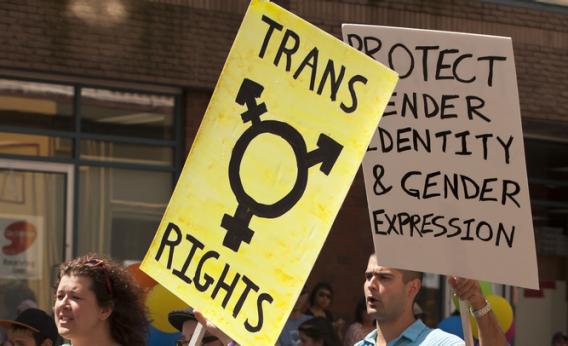If you are not in regular contact with the LGBTQ community and haven’t been on a college campus in a while, you might be forgiven for being unfamiliar with “preferred gender pronouns,” the practice of asking individuals what pronouns they use for themselves in an effort to respect the diversity of gender identities beyond male and female. Earlier this week, Gawker provided us with an opportunity to discuss why PGPs are wise in theory but obnoxious in practice.
The teachable moment: In the course of making fun of a soul-searching post from xoJane writer S.E. Smith, whose name is stylized using lowercase letters, about whether the Western practice of yoga constituted cultural appropriation, Gawker’s Hamilton Nolan referred to Smith using female pronouns. This was likely because in Smith’s author photo on xoJane, Smith reads as female, traditionally speaking. Now, Nolan happened to be wrong in this case—Smith identifies as genderqueer, a category for anything other than male/female, and prefers the pronoun “ou.” Smith’s colleagues alerted Nolan to his error with not one but three separate “urgent” emails demanding a “fix ASAP,” which Nolan, naturally, posted and responded to with a sarcastic “Ok.” The pronouns were edited, using strike-throughs on the female words no doubt for humorous effect. A colleague sent around Nolan’s post with a one-line commentary, “crazy correction request,” which I suspect is how most people viewed it.
My own reaction was more mixed. On the one hand, I’m very sympathetic to the impulse behind the PGP model. Part of an effort to make schools and other communities more trans- and genderqueer-friendly, the growing insistence on PGPs is designed to draw attention to the fact that much of our everyday speech includes assumptions about the gender of the people we’re dealing with. In other words, the “he” you think you are talking to might actually identify as a “she,” so when you call something “his” you are using the wrong pronoun and perhaps even causing that person pain.
So in practice, a courteous, trans-supportive person should ask his or her interlocutor which pronouns—of the traditionally gendered sort or any number of gender-neutral neologisms—she or he should use in his/her/hir/zir/their presence, preferably just after proper names have been exchanged. And yes, the idea is that this inquiry should become standard at the start of every interaction with a new person (and perhaps multiple times, as gender is now understood to be fluid), whether or not you suspect the person you are talking to might be gender nonconforming.
At its best, the PGP movement has the potential to inject a much-needed dose of human respect into daily conversation; as a moderately masculine gay man who tries to be a trans ally, I’m particularly interested in affirming the many people who do not experience themselves as traditionally male or female. However, as a social creature, I also must acknowledge that the implementation of PGPs is often off-putting and probably counterproductive, as it clearly was in the Gawker case. Does it have to be this way?
Though it’s not an ideal solution, my suspicion is that PGPs work best among intimates, friends, and colleagues. When you try to export the model to larger social interactions or to print, the potential for misunderstanding and perceived (or real) stridency outweigh personal comforts—this is what happened with Smith anyway. In this case, mostly because life is short, my gut instinct would have been to ignore Nolan’s flawed—though certainly nonmalicious—assumption because, well, it’s a blog post. Moreover, most publications have house styles that do not admit bespoke pronouns for the simple reason that including them would be grammatically distracting and require a structurally awkward explanation. And though Smith got the “ous” in the end, the victory is pyrrhic: When the post made its way through my networks, the focus was all on Smith’s insistence on a difficult-to-pronounce pronoun rather than on ou’s thoughts about yoga.
I suppose Smith could blame that effect on a readership not enlightened enough to find PGPs unremarkable. But there is something self-defeating about expecting the world to essentially read and sign a disclaimer before engaging with you, especially when the situation is impersonal. Well-meaning people accidentally disrespect one another all the time. Ideally, those unintended slights are gently corrected, and everyone moves on. And though the PGP model is meant to help that process along, it has the potential to transform into a more-progressive-than-thou whip—the crack of which helps no one’s cause.
One of the common refrains of PGP training is that it is not the gender nonconforming person’s responsibility to “educate” others. While constantly explaining yourself surely becomes tiresome, expecting people to change something as basic and ingrained as grammar is actually kind of a big ask. Some instruction is going to be required, as is a fair amount of patience and generosity of spirit. And sometimes—like when Gawker is ragging on your blog post—you might do better to just close the tab.
